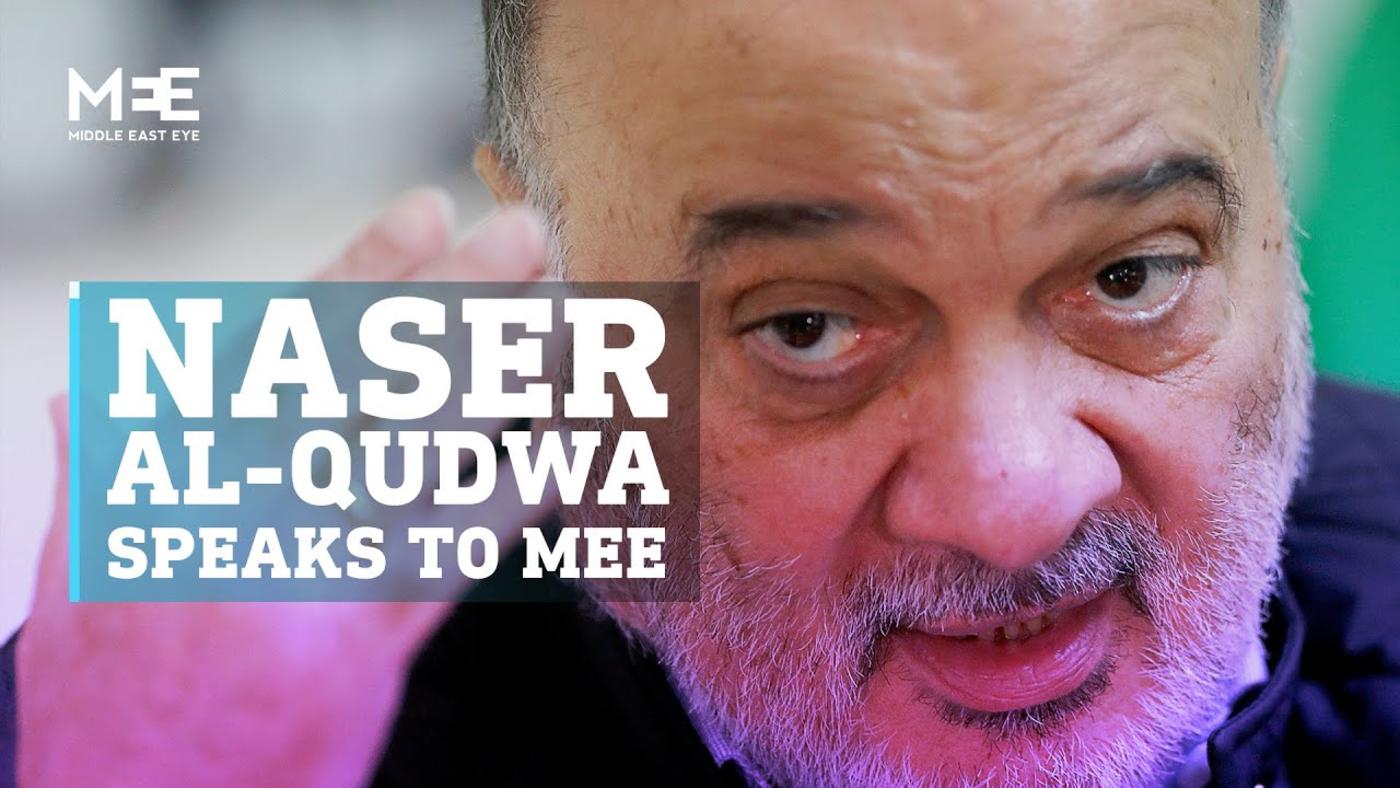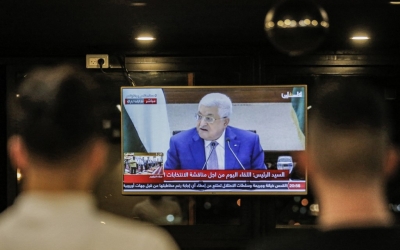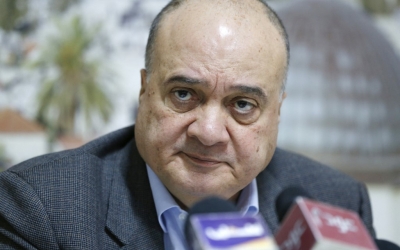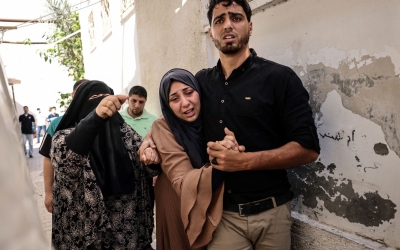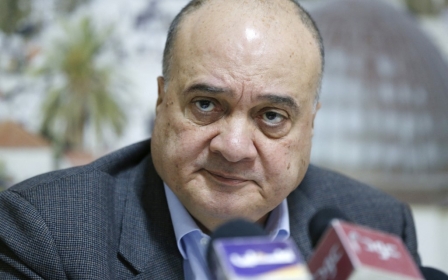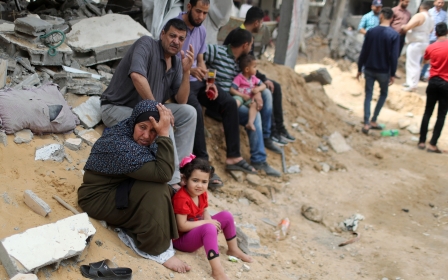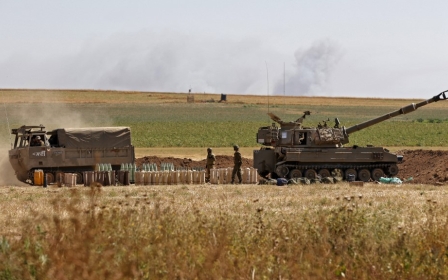Israel-Gaza: Ceasefire will not quell Palestinian uprising, says Nasser al-Qudwa
The uprising of Palestinians in Jerusalem and Israel will not die down despite a ceasefire between Israel and Hamas, Nasser al-Qudwa, one of the most prominent politicians in the West Bank has told Middle East Eye.
"The mere fact of reaching a kind of ceasefire in Gaza is not going to do the trick,” Qudwa said in an interview conducted before the deal to end the current round of fighting came into effect early on Friday morning.
New MEE newsletter: Jerusalem Dispatch
Sign up to get the latest insights and analysis on Israel-Palestine, alongside Turkey Unpacked and other MEE newsletters
“It's not going to solve all the problems and most probably we will see more of the same, more of the flare up situations and more confrontations and maybe even one more confrontation in Gaza, or between Gaza and Israel itself.”
Qudwa, the nephew of former Palestinian leader Yasser Arafat, said the events of the past two weeks had proved beyond doubt the need for the Palestinian leadership to reform.
Asked whether Mahmoud Abbas was still fit to be president after postponing Palestinian elections due to be held this month, Qudwa replied:
“Well, I wouldn't like to personalise things, but I think the current situation is untenable. We need to change, and change in my mind means changing persons, personalities, changing policies, as well as changing positions. The continuation of what we have now will lead to only more problems and more catastrophes for the Palestinian people."
'Fatah to the bone'
Qudwa, a former Palestinian representative to the United Nations and a former foreign minister, was stripped of his party membership in March after he refused to run on a single election list representing all Fatah candidates.
Qudwa was a member of the party's central committee at the time of his expulsion and described himself then as “Fatah to the bone”.
In his interview with MEE, Qudwa said he did not recognise the legitimacy of the action taken by the committee and predicted that his expulsion “would not be the end of the story”.
“What we see now is not just from my personal point of view, it is not the Fatah I know,” he said.
Qudwa said he believed Marwan Barghouti, the imprisoned Fatah leader whose wife and friends were on his rival Freedom list, would have toppled Abbas as president if legislative and presidential elections had gone ahead.
“I have no doubt in my mind that, with regard to the legislative elections, the Freedom list would have scored high and achieved probably surprising results. And I also have no doubt in my mind that had Marwan Barghouti ran for the presidency he would have won.”
Barghouti, who is serving five life sentences in an Israeli prison for allegedly plotting attacks during the Second Intifada, has just been transfered to the maximum-security Ayalon prison in Ramallah.
Qudwa hit out at Nabil Abu Rudeineh, Abbas's official spokesman, for claiming recently that security cooperation with Israel was an act of “Palestinian sovereignty and the defence of our people”.
Qudwa said that what was taking place now was much worse than coordination.
“Unfortunately part of our security structures are linked to Israeli security, so it's hard to call this coordination. In any case, it's not a sovereign right. It's something some of us are pursuing contrary to the national interests of the Palestinian people.”
Hamas not the enemy
Qudwa, a staunch critic of Hamas, acknowledged that the movement was gaining popularity in the West Bank, with Hamas and Fatah flags appearing alongside each other at demonstrations in Nablus.
Speaking to MEE, he said it was “unacceptable” to accuse Hamas of starting the latest fighting by firing a volley of missiles towards Jerusalem, or to say that the current conflict was started by Palestinian attacks against Israelis.
Hamas fired rockets from Gaza after Israel failed to meet a Hamas deadline to withdraw its security forces from the al-Aqsa Mosque, where they had attacked Palestinian protesters and worshippers. Israel subsequently launched air strikes against Gaza.
“At the heart of it, it's the long-lasting Israeli policies, all kind of negative, outrageous policies against the Palestinian people everywhere that led to the current situation and the common unified reaction by all parts of the Palestinian people everywhere.
“And that includes, by the way, people in the diaspora outside Palestine, outside the region, and we see every day demonstrations, actions and solidarity actions by Palestinian communities, in addition to their friends, our friends from all over the world,” he said.
Qudwa said he had differences with Hamas but had never considered it the enemy.
“I strongly pushed for achieving unification and ending the split. Unfortunately I did not think the last deal between Hamas and Fatah - or the deal between part of Hamas and part of Fatah - would get us closer to ending the split.”
Qudwa said reunification depended on three elements - the return of Gaza to the political and administrative Palestinian system, a “serious sharing” of a political system which was open to everyone, including the PLO, and a common political programme.
Qudwa said there needed to a body or institution entrusted to implement this deal.
'Frank dialogue'
He said recent normalisation deals between Arab states - including the United Arab Emirates and Bahrain - and Israel had not merely reversed the Arab Peace Initiative, which promised to lift the diplomatic and trade boycott of Israel after its withdrawal from occupied territories.
“What they did was to normalise relations without withdrawal,” Qudwa said.
Qudwa also doubted what those Arab states hoped to gain from Israel. He said normalisation would not have protected Saudi Arabia from missiles and drones targeting Aramco facilities, referring to recent attacks targeting the kingdom by Houthi militants in Yemen.
“I think they made a mistake and that it's not sustainable. On the other hand, I think we need to have dialogue, a frank dialogue with our Arab brothers. We need to regain their respect and tell them the truth. And we need to try again to forge a common position in the interests of the Palestinian people.”
Middle East Eye delivers independent and unrivalled coverage and analysis of the Middle East, North Africa and beyond. To learn more about republishing this content and the associated fees, please fill out this form. More about MEE can be found here.


